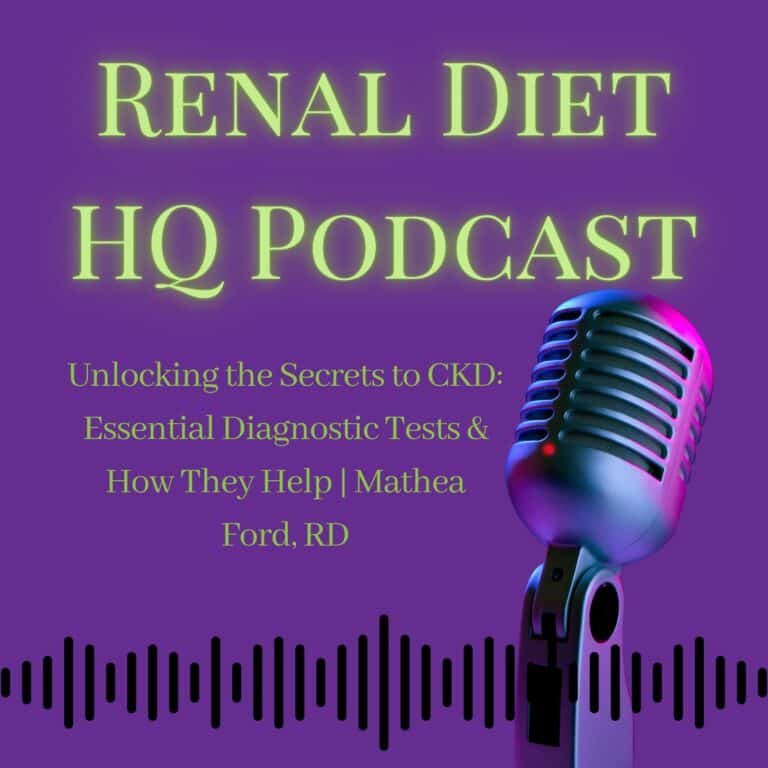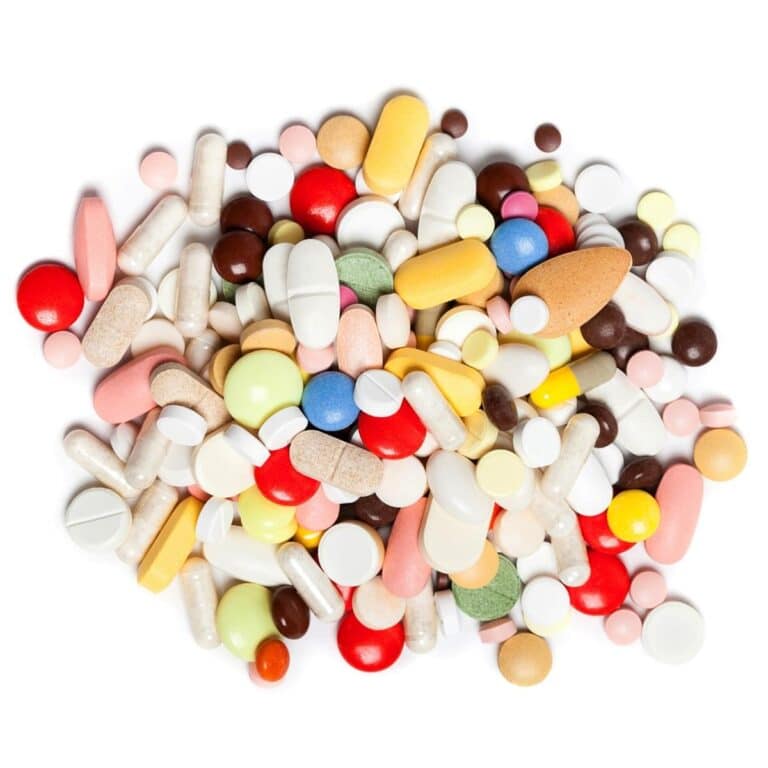How To Improve BUN Level
If you have chronic kidney disease, you have likely heard the words Blood Urea Nitrogen (BUN) levels many times over, but you may not know exactly why they are important. BUN levels are a way to measure how well your kidneys are functioning.
Urea nitrogen is a waste product that comes from the liver’s process of breaking down proteins in the body. Your kidneys are a key component in removing toxins and waste from the body, and one of the things they remove is urea nitrogen.

So, if your BUN levels are increasing, it shows signs that your kidneys are not properly removing this waste and can indicate kidney damage. For those with chronic kidney disease, it can be used as a way to measure improvements or further damage that may be affecting your kidney function.
Jump to:
- Key Takeaways
- Understanding BUN Levels and Their Importance
- The Role of the BUN Test in Diagnosing Kidney and Liver Conditions
- Normal BUN Level Range and What It Means for Your Kidney Health
- The Connection Between Dehydration and Increased BUN Levels
- The Impact of Protein Intake on BUN Levels
- Increasing Fiber Intake to Improve BUN Levels
- Identifying the Causes of High BUN and Creatinine Levels
- Recognizing the Symptoms of High Blood Urea Nitrogen
- The Importance of Regular Check-ups in Monitoring BUN Levels
- FAQs for Improving Bun Levels
- You Can Take Action To Improve Your BUN Levels
Key Takeaways
- Understanding BUN levels is vital for kidney health monitoring, with high levels signaling potential kidney issues.
- BUN levels reflect kidney function and can indicate dehydration, high protein intake, and other factors, requiring proper context for interpretation.
- The Blood Urea Nitrogen test is essential in diagnosing kidney and liver conditions, aiding medical professionals in assessing overall health.
- Chronic kidney disease progresses with increasing BUN levels, necessitating monitoring alongside other markers for accurate assessment.
- Maintaining hydration is crucial for optimal kidney function and balanced BUN levels, while dietary fiber can aid in BUN regulation.
For More Recipes and Ideas --->> Get Your Free Meals and Recipes That Are Perfect for Pre-Dialysis Diets, Pre-Dialysis with Diabetes, or Dialysis Diets.
Understanding BUN Levels and Their Importance
Want to learn how to manage chronic kidney disease? Understanding your blood urea nitrogen (BUN) levels is a crucial aspect of monitoring your overall health, particularly your kidney function. If you're experiencing high BUN levels, it may be indicative of kidney disease or other serious health conditions.
However, don't worry, as there are several strategies that can help in improving your kidney function and subsequently lowering your BUN levels - let's delve deeper into these essential topics to better manage your health.
Understanding BUN Levels
It's crucial to comprehend BUN levels, as they play a significant role in identifying kidney function and potential issues. Understanding the significance of BUN can help you serve others more effectively in healthcare settings.
| BUN Significance | BUN Misconceptions | BUN Variations |
| Essential for assessing kidney health | Not solely an indicator of kidney disease | Levels can fluctuate due to various factors |
| Can indicate dehydration or high protein diet | Higher levels don't always mean severe illness | Age, diet, and medications can influence readings |
| Used alongside other tests for proper diagnosis | Lower levels aren't necessarily optimal | Normal range differs between labs |
Beware of myths surrounding BUN abnormalities. Elevated or decreased levels might not always signify a major problem, but it's important to consult with healthcare professionals for accurate interpretations. By doing so, you'll contribute towards improved patient care.
BUN and Kidney Function
Blood Urea Nitrogen is a widely used blood test that provides insights into kidney function and overall health. BUN reflects the level of nitrogen, a waste product of protein metabolism, in the bloodstream.
The kidneys play a pivotal role in filtering out urea, which is later excreted through urine. Elevated BUN levels can indicate impaired kidney function, as the kidneys might not be efficiently clearing urea from the blood.
However, BUN levels can also be influenced by factors like diet, hydration, and certain medications. Interpretation must consider various factors, including the patient's medical history, to accurately assess kidney health.
BUN is often used in conjunction with other tests to diagnose and monitor kidney conditions, helping healthcare providers evaluate renal function and potential underlying issues. You can also start improving kidney function with diet.
The Role of the BUN Test in Diagnosing Kidney and Liver Conditions
When you're trying to understand what's going on with your body, a BUN test can provide vital insights.
It plays an instrumental role in diagnosing kidney and liver conditions, helping medical professionals analyze your overall health status.
Knowing about this diagnostic tool can empower you to take better charge of your wellness journey, particularly if you're dealing with kidney or liver issues.

BUN Test's Diagnostic Role
The BUN test is a valuable diagnostic tool not only for kidney disease but also for assessing a variety of conditions. Elevated BUN levels often signify impaired kidney function, aiding in the diagnosis and monitoring of acute and chronic kidney diseases.
Additionally, the BUN test is used to detect dehydration (such as in severe burns), heart failure, and gastrointestinal bleeding. In liver disease, BUN levels can rise due to reduced urea metabolism as a result of the liver damage. Conversely, certain conditions like malnutrition or a low protein diet can lead to low BUN levels.
The BUN test's diagnostic role extends beyond renal health, providing insights into broader health issues. Interpretation of results requires consideration of medical history, medications, and overall clinical context.
By contributing to the identification and management of various disease conditions, the BUN test serves as a versatile marker in medical diagnostics.
Kidney and Liver Conditions
The Blood Urea Nitrogen test is instrumental in diagnosing and monitoring kidney and liver conditions. Elevated BUN levels are indicative of impaired kidney function and can help diagnose acute or chronic kidney disease, dehydration, and congestive heart failure (heart healthy lifestyle changes for CKD).
In liver conditions, such as cirrhosis or hepatitis, elevated BUN levels may occur due to reduced urea metabolism. Conversely, certain kidney and liver conditions, like acute glomerulonephritis or acute liver failure, can cause low BUN levels.
The BUN-to-creatinine ratio aids in distinguishing between prerenal and intrinsic renal causes of kidney dysfunction. Monitoring BUN trends helps assess disease progression and treatment effectiveness.
The BUN test's ability to reflect kidney and liver health makes it a crucial tool in diagnosing and managing a spectrum of related conditions.
Normal BUN Level Range and What It Means for Your Kidney Health
Understanding your Blood Urea Nitrogen level range is crucial in managing your kidney health. It's a reliable indicator of how well your kidneys are functioning and processing waste.
If you're ever concerned about what your BUN levels mean, it's essential to consult with a medical professional who can help interpret these values and guide you on the best ways to maintain optimal kidney health.
Interpreting BUN Level Range
Interpreting Blood Urea Nitrogen (BUN) levels involves understanding the reference ranges.
For adult men, the normal BUN range is 8 to 24 mg/dL, while for adult women, it's 6 to 21 mg/dL. In children aged 1 to 17, the typical range is 7 to 20 mg/dL.
BUN levels reflect the balance between urea production and kidney filtration. Elevated BUN can signify reduction in kidney function, dehydration, or other conditions like heart failure.
Lower BUN may be observed in severe liver disease, malnutrition, or overhydration. Context is essential; interpreting BUN should be done alongside other clinical and lab tests.
A BUN-to-creatinine ratio can help differentiate prerenal causes from intrinsic kidney issues. Accurate interpretation of BUN ranges aids healthcare professionals in diagnosing and managing kidney, liver, and other related health conditions.
BUN and Chronic Kidney Disease
Blood Urea Nitrogen levels play a crucial role in assessing and monitoring chronic kidney disease (CKD) at its various stages. In the early stages of CKD, BUN levels may remain within the normal range or slightly elevated. As the disease progresses, BUN levels tend to increase due to reduced kidney function in filtering and excreting waste products.
In Stage 1 and Stage 2 CKD, BUN levels may not show significant changes, but they can provide early indications of kidney dysfunction when considered alongside other markers. During Stage 3 CKD, BUN levels might begin to rise, indicating compromised renal function and reduced filtration.
In Stage 4 and Stage 5 CKD, BUN levels often become markedly elevated, reflecting severe kidney impairment. At these advanced stages, the kidneys struggle to clear urea from the bloodstream, resulting in an accumulation of nitrogen waste products.
High BUN levels can also suggest complications related to CKD, such as fluid and electrolyte imbalances, acidosis, and cardiovascular risks.
However, it's important to interpret BUN levels in conjunction with other parameters, such as serum creatinine and estimated glomerular filtration rate (eGFR), for a comprehensive assessment of kidney function.
The Connection Between Dehydration and Increased BUN Levels
Understanding the connection between dehydration and increased BUN levels is crucial for your health. When you're dehydrated (fluids to hydrate with kidney disorder), your BUN levels can rise because your kidneys aren't receiving enough fluid to function properly.
Understanding how hydration impacts these levels not only promotes healthy kidney function but also helps in maintaining an optimal BUN level.
Dehydration's Effect on BUN
Dehydration significantly impacts kidney function and Blood Urea Nitrogen levels. The kidneys play a crucial role in maintaining fluid balance and filtering waste products from the blood, including urea.
In dehydration, reduced fluid intake leads to decreased blood volume, impairing the kidneys' ability to effectively filter and eliminate waste. This results in a higher concentration of urea in the blood, leading to elevated BUN levels.
Dehydration-induced high BUN levels could indicate compromised kidney function, but they should be interpreted alongside other clinical indicators.
Adequate hydration is essential for optimal kidney function, as it helps prevent the buildup of waste products and reduces the strain on the kidneys. Monitoring BUN levels and maintaining proper fluid intake is crucial for supporting kidney health and overall well-being.
BUN Levels and Hydration
Proper hydration plays a vital role in maintaining optimal Blood Urea Nitrogen (BUN) levels and kidney function. Ample water intake helps to ensure efficient filtration and elimination of waste products, including urea, from the bloodstream.
Sufficient hydration supports blood flow to the kidneys, enhancing their ability to process and excrete waste products. When adequately hydrated, BUN levels are more likely to remain within a healthy range. Dehydration, on the other hand, can lead to concentrated blood and reduced kidney function, resulting in elevated BUN levels.
Regularly drinking water helps maintain the balance between waste elimination and BUN production, promoting kidney health and preventing undue strain on these vital organs.
It's important to note that individual hydration needs may vary based on factors like age, activity level, and health conditions, so consulting a healthcare professional is recommended.
The Impact of Protein Intake on BUN Levels
How much protein in CKD Diets? As you strive to manage your blood urea nitrogen levels, it's important to consider the role of protein intake.
Proteins, being a significant source of nitrogen, could potentially elevate BUN levels if consumed in high amounts.
By effectively managing your diet, particularly the amounts of protein you consume, you're taking an active step towards maintaining optimal BUN levels and overall renal health.
Protein Intake and BUN
You'll need to monitor your daily protein intake since it can directly impact your BUN levels. It's essential to understand that not all protein rich foods are created equal and the type of protein you consume can affect how your body absorbs and metabolizes it.
- Protein Sources: Animal proteins, such as meat and dairy, tend to increase BUN levels more than plant-based proteins. Vegetarian diets (vegan renal diet) can provide adequate protein without excessively elevating BUN levels.
- Protein Absorption & Alternatives: Your body may absorb some types of protein better than others. Consider incorporating a variety of different proteins into your diet. Protein supplements could be a suitable alternative if you struggle with getting enough from food alone.
Making these adjustments might help manage and improve your BUN levels effectively.
Managing BUN through Diet
Managing BUN levels through diet involves more than just moderating protein intake. A balanced approach includes controlling ingestion of sodium, as excess sodium can burden the kidneys and elevate BUN.
Additionally, maintaining proper hydration is crucial to prevent concentrated blood and ease the kidneys' workload. Incorporating foods rich in antioxidants and anti-inflammatory properties, like fruits and vegetables, can support kidney health. Consuming foods with adequate fiber content helps prevent constipation, which can indirectly impact BUN levels by reducing waste buildup.
Lastly, avoiding excessive alcohol and caffeine consumption is advisable, as they can impact hydration and kidney function. Consulting a registered dietitian for personalized guidance tailored to individual health conditions is recommended for effective BUN management.
Increasing Fiber Intake to Improve BUN Levels
In managing your BUN levels, increasing your fiber intake plays a significant role.
Fiber helps regulate BUN by aiding in the elimination of waste products from your body, including excess nitrogen.
By making dietary changes to include more high-fiber foods, you're taking an active step towards improving and maintaining healthy BUN levels.
Fiber's Role in BUN Regulation
Dietary fiber plays a valuable role in regulating BUN levels, especially in individuals with chronic kidney disease (CKD). A meta-analysis has revealed that dietary fiber supplementation can effectively lower uremic toxin levels in CKD patients, particularly those on dialysis and without diabetes.
This underscores the potential of dietary fiber to impact BUN regulation. Fiber's mechanism lies in its ability to promote better gut health, enhancing digestion and waste elimination.
By preventing constipation and promoting regular bowel movements, fiber reduces the accumulation of waste products that contribute to elevated BUN levels.
These findings emphasize the importance of incorporating fiber-rich foods, such as whole grains, fruits, vegetables, and legumes, into the diets of CKD patients to support kidney health and BUN regulation.
Dietary Changes for BUN Improvement
Incorporating more dietary fiber can positively influence BUN levels. To increase fiber intake, opt for whole grains like brown rice, whole wheat bread, and quinoa. Include a variety of fruits such as berries, apples, and pears, and add fruits and vegetables like broccoli, carrots, and spinach to your meals.
Legumes like lentils, beans, and chickpeas are also rich in fiber. Snack on nuts and seeds, like almonds and chia seeds, and replace refined snacks with whole fruits or raw veggies.
Gradually introduce high-fiber foods to prevent digestive discomfort, and ensure adequate fluid intake to aid digestion. A fiber-rich diet supports gut health, enhances waste elimination, and can contribute to improved BUN levels, especially for individuals with kidney concerns.

Identifying the Causes of High BUN and Creatinine Levels
Understanding the triggers that can lead to high BUN and blood creatinine levels is a critical part of managing your kidney health.
If you're noticing symptoms such as fatigue, loss of appetite, or difficulty concentrating, these could be indicators of elevated BUN levels.
By identifying these key factors and recognizing the signs early on, you'll be better equipped to take proactive steps in maintaining optimal kidney function.
Identifying BUN Level Triggers
Elevated BUN levels can be indicative of various underlying health conditions. Dehydration, a common cause, reduces kidney perfusion and impairs proper filtration. Kidney diseases like acute or chronic kidney injury can lead to elevated BUN due to decreased filtration or impaired function.
Conditions that increase protein breakdown, like certain infections or cancer, can elevate BUN levels. Gastrointestinal bleeding, resulting in increased blood protein breakdown, can also contribute.
High-protein diets, intense exercise, and certain medications may temporarily elevate BUN. Liver disease, affecting urea production, can lead to elevated levels. Factors such as age, diet, and muscle mass can influence BUN levels too.
Accurate diagnosis involves considering medical history, symptoms, and additional tests to identify the underlying cause of elevated BUN.
Diagnosing the Cause of Elevated BUN
Diagnosing the cause of elevated BUN involves a comprehensive approach by medical professionals. They consider various factors including medical history, symptoms, and concurrent conditions.
Initial assessments often include kidney function tests such as serum creatinine levels, urine analysis, and imaging scans. BUN to creatinine ratio can provide insights into potential causes. If kidney dysfunction is suspected, glomerular filtration rate calculations are crucial.
Medical history regarding medications (commonly prescribed medications for CKD), recent illnesses, and dietary habits helps identify potential contributors. Evaluating hydration status is vital as inadequate hydration can elevate BUN. In cases of suspected liver disease or gastrointestinal bleeding, further tests like liver function tests, endoscopy, or imaging are conducted.
Collaborative interpretation of these findings aids in diagnosing the underlying condition responsible for elevated BUN, allowing medical professionals to formulate appropriate treatment strategies.
Recognizing the Symptoms of High Blood Urea Nitrogen
As you dig into understanding high blood urea nitrogen, it's crucial to recognize the symptoms that may alert you to this condition.
Changes in your urination pattern, such as increased frequency or difficulty urinating can be a red flag.
You may also experience fatigue, which isn't just about feeling tired but experiencing an overall lack of energy, and noticeable swelling (edema) particularly in your hands, feet, and ankles. Notice progression of symptoms for CKD.
Recognizing Urination Changes
You'll need to pay close attention to any changes in your urination patterns, such as the frequency or color, as these could indicate that your BUN levels are off balance. If you notice an increase in urination frequency or nocturia occurrences (waking up multiple times at night to urinate), it might be a signal of high BUN levels.
Urinary pain and incontinence issues can also be associated with this condition. Be vigilant about observing these symptoms and seek medical assistance promptly if they persist.
| Symptoms | Possible Indications |
| Increased Urination Frequency | High BUN Levels |
| Nocturnal Occurrences | High BUN Levels |
| Color Changes in Urine | Dehydration or Kidney Issues |
| Urinary Pain | UTI or Kidney Stones |
| Incontinence Issues | Weak Bladder Muscles |
Remember, early recognition is key to managing and improving your bun levels effectively.
Exhaustion
Exhaustion and fatigue can be a symptom of high BUN, and elevated creatinine levels as the increase of waste products can cause you to feel sluggish. If you are a patient with chronic kidney disease and you have been feeling unusually sluggish or exhausted, you should schedule an appointment with your physician to check your BUN and creatinine levels.
If you have an increased amount of these waste products that your kidneys have not been able to remove from your body, these tests will be higher, and you may require medication or a renal diet change.
Swelling of the extremities
Much like some of our other symptoms on this list, swelling of the extremities can indicate an issue of dehydration or further kidney damage. This is also a symptom of high BUN and creatinine levels, and should be addressed by your doctor immediately.
If you are a patient on dialysis, you are probably familiar with the fact that the swelling of the arms and legs can indicate something known as retention.
Retention is indicative of end-stage renal failure, and dialysis patients must go to regular dialysis appointments to avoid this serious condition.
Swelling and retention is a symptom of high BUN levels and creatinine because it indicates that the kidneys are not successfully removing excess wastes, toxins, and fluids from the body. Use these tips to avoid end stage renal disease.
The Importance of Regular Check-ups in Monitoring BUN Levels
Understanding your body's health status is crucial, and regular check-ups play a significant role in this process.
By consistently monitoring your Blood Urea Nitrogen (BUN) levels, you're able to detect any abnormalities early on, mitigate potential issues promptly, and manage your overall health effectively.
Don't underestimate the importance of these routine assessments; they offer invaluable insights into your kidney function and are key in maintaining optimum health.
Significance of Regular Check-ups
Regular check-ups are crucial in monitoring your BUN level and detecting any abnormalities early. With a robust focus on preventive healthcare, these regular screenings allow for timely intervention if necessary, promoting health awareness among individuals. It's not just about early detection; it is also about maintaining overall wellbeing.
Medical consultations provide an opportunity to discuss any concerns or symptoms you may be experiencing with your doctor. They can recommend lifestyle changes or treatments that would aid in health maintenance and potentially improve your BUN levels.
Regular check-ups ensure that you're proactive about your health, making informed decisions based on professional advice. So make sure to schedule and attend regular appointments with your healthcare provider – it's an essential step in taking care of yourself and serving others around you better too.
Monitoring BUN Levels Effectively
Monitoring BUN levels effectively requires the guidance of a health professional. Regular testing, ideally as part of a comprehensive kidney function panel, helps track trends and assess any deviations.
A health professional interprets BUN results in context, considering factors like age, sex, hydration, and concurrent health conditions. They provide personalized recommendations based on the evolving BUN levels, ensuring appropriate interventions if necessary.
Collaborating with a healthcare provider allows for adjustments in treatment plans, dietary modifications, or medication changes to address elevated BUN effectively. This proactive approach helps prevent potential complications and ensures optimal kidney health.
Regular communication with a health professional fosters a comprehensive understanding of BUN dynamics and supports informed decision-making for maintaining overall well-being.
FAQs for Improving Bun Levels
Age and gender can impact BUN levels. Generally, BUN tends to increase slightly with age due to a decrease in kidney function as we get older. Men often have slightly higher BUN levels compared to women, which can be attributed to muscle mass differences, as muscles produce urea.
However, these variations are usually within the normal range and need to be considered alongside other factors when assessing kidney function. Interpretation of BUN levels should consider individual health, hydration status, and any underlying medical conditions. Keep in mind, improving kidney function with diet is possible.
Certain medications can raise BUN levels. Nonsteroidal anti-inflammatory drugs (NSAIDs), such as ibuprofen, can impact kidney function and elevate BUN. ACE inhibitors and angiotensin receptor blockers (ARBs), commonly used to manage high blood pressure, may also cause a mild increase in BUN.
Additionally, diuretics, often prescribed for fluid retention, can lead to dehydration and subsequently elevated BUN levels. Other drugs such as aminoglycoside antibiotics can also increase BUN.
It's important to monitor BUN when taking these medications, especially in individuals with pre-existing kidney conditions, and consult a healthcare professional if there are concerns about medication effects on BUN levels.
Questions about kidney transplant? High BUN levels can indicate kidney or liver dysfunction. If not addressed, they may lead to serious complications. For the kidneys, prolonged high BUN can signify chronic kidney disease, which might progress to kidney failure, requiring dialysis or kidney transplant.
Elevated BUN levels might also point to dehydration or heart failure. In severe cases, excessively high BUN can cause uremia, a condition where waste products accumulate in the bloodstream, leading to symptoms like nausea, confusion, and even coma.
Timely intervention is crucial to identify and manage underlying causes, preventing the progression of kidney or other organ-related issues.
Yes, stress and lifestyle can impact BUN levels. Stress can lead to dehydration, raising BUN levels. Lifestyle factors like diet and physical activity influence protein intake and metabolism, affecting BUN. High-protein diets and intense exercise might elevate BUN temporarily.
Additionally, alcohol and certain medications can impact kidney function and BUN. Chronic stress or unhealthy lifestyle choices can contribute to long-term kidney issues, influencing BUN levels.
Thus, managing stress, maintaining a balanced diet, staying hydrated, and adopting a healthy lifestyle are crucial for optimizing BUN levels and overall kidney health.
Yes, engaging in regular exercise and physical activity can potentially help improve BUN levels. Exercise promotes better cardiovascular health and circulation, which can support kidney function. Physical activity also contributes to maintaining proper hydration and overall metabolic balance.
However, intense or excessive exercise might temporarily elevate BUN due to increased protein breakdown. It's important to strike a balance between activity levels and protein intake. Consulting a healthcare professional before making significant changes to exercise routines is advisable, especially for individuals with kidney concerns.
You Can Take Action To Improve Your BUN Levels
Understanding your Blood Urea Nitrogen levels is paramount for monitoring kidney function and overall health. By comprehending the significance of BUN and its role in diagnosing kidney and liver conditions, you can take proactive steps towards maintaining optimal health.
Interpreting BUN levels within their reference ranges and their association with chronic kidney disease stages enhances disease management. Hydration's impact on BUN underscores the need for maintaining proper fluid intake.
Dietary adjustments, including fiber-rich foods, can aid BUN regulation, while recognizing causes of elevated BUN is vital for early and accurate diagnosis. Regular check-ups and effective monitoring with healthcare professionals ensure proactive health management.
Age, gender, medications, stress, and lifestyle can all influence BUN levels, emphasizing the complexity of its interpretation. In navigating the intricacies of BUN, knowledge empowers individuals to make informed choices for their kidney health, ultimately contributing to a healthier life.
















Foods high in soluble fiber = Oatmeal, Apples, Oranges, Pears, Prunes, Bananas, Kidney - Beans, Lentils, Lima Beans
I have been told no bananas, lentils, prunes.
I have been told no oatmeal,bananas, beans, and prunes. So what is right?